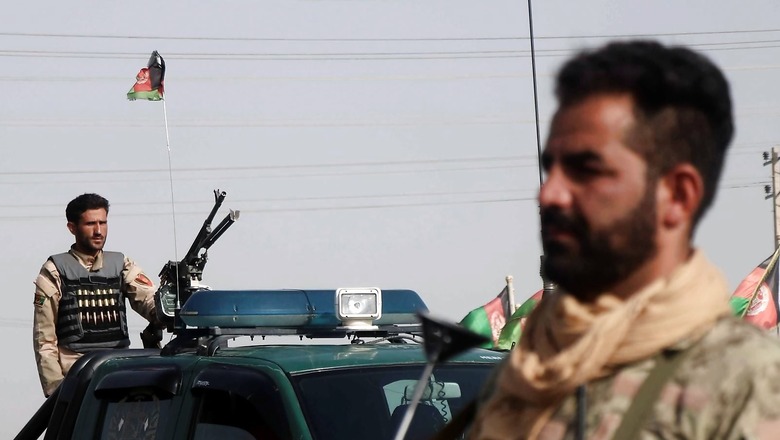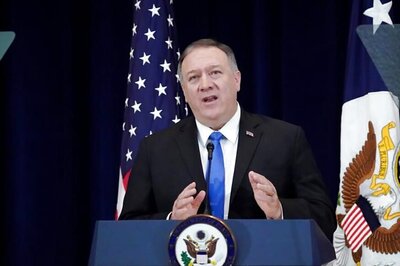
views
The Taliban have captured more than a quarter of Afghanistan’s 34 provincial capitals in less than a week, the latest being the city of Ghazni on Thursday. The US intelligence has warned that Afghanistan’s capital, Kabul, a few hours drive away, could fall to the insurgents within 90 days.
Tens and thousands of people have been killed and millions displaced as a result of the ongoing crisis in Afghanistan.
Why are Taliban Attacking Afghanistan?
The Taliban, which has vowed to stop Afghanistan from becoming “a base for terrorists” who could threaten the West, intensified its fight in the county in May, after NATO began a final withdrawal of its mission in Afghanistan involving 9,600 soldiers. About 2,500 of these soldiers were American. In mid-May, US forces withdraw from the air base in Kandahar, one of the largest in the country.
The United States began pulling its troops out of Afghanistan following a deal between the US and the Taliban militants they removed from power back in 2001, leading to a further surge in Taliban’s fight and its seizing of territory.
In mid-June, the insurgents captured several districts in the northern provinces of Faryab, Takhar and Badakhshan, forcing the Afghan military to retreat from a number of areas.
On July 2, officials announced the departure of all US and NATO troops from Bagram, Afghanistan’s biggest air base, which served as the linchpin of US-led operations in the country for the previous two decades. Two days later, the Taliban seized the key district of Panjwai in Kandahar, the insurgents’ birthplace and former bastion.
The biggest blow to the country came on July 22 when the Taliban declared that they now control 90 percent of Afghanistan’s borders. The figure was disputed by the Afghan government.
At present, they have taken more than a quarter of Afghanistan’s 34 provincial capitals in less than a week as United States-led foreign forces pull out of the country.
Will Taliban Take Over Afghanistan?
While US President Joe Biden has expressed confidence that militants will not topple the government in Kabul, an assessment by the US intelligence in June suggested that the Afghan government could be thrown out of power within six months of the US military departure.
Return of the Brutal Force
While some Taliban commanders have behaved with restraint in newly captured territory, rights groups say others have acted much like the brutal Taliban the U.S. overthrew in 2001. That includes allegedly killing detainees en masse and demanding, in an allegation denied by a Taliban spokesman, that communities provide them with females above age 15 to marry.
Biden administration officials have kept up the hopeful claim that a desire for international approval might influence Taliban actions. U.S. envoy for Afghanistan Zalmay Khalilzad traveled to Qatar this week to make that point to Taliban officials directly, telling Voice of America that if the Taliban took over Afghanistan by force “they will become a pariah state.”
Administration officials reject criticism by Senate Minority Leader Mitch McConnell, R-Ky., who opposes the withdrawal and dismisses what he calls “diplomatic carrots.″
Regardless of whether the Taliban heeds that warning, Biden shows no sign of slowing or reversing a decision to withdraw from the war.
The Deal With US
The US is ending its nearly 20-year combat mission in the country on August 31 under a deal that President Donald Trump signed with the Taliban in 2020. The US invasion beginning in October 2001 broke up the Afghanistan-based al-Qaida that had plotted the Sept. 11 attacks. It overthrew, with Afghan allies, the Taliban government that had refused to surrender Osama bin Laden.
For today’s Taliban, U.S. talk of things like international inclusion, aid and reconstruction money might have mattered more had it come even a few years ago, said Andrew Watkins, senior Afghanistan analyst for the International Crisis Group.
The Taliban today have been emboldened by the U.S. withdrawal. Hopes of grabbing all or much of Afghanistan, with all the border import fees and other revenues a country offers, make international support less essential.
Will Taliban Adhere to the US Deal?
In February 2020, the Taliban and the US struck a deal as part of which the US agreed to withdraw its troops from Afghanistan and the Taliban said it would not attack the US forces.
While Taliban officials have been insisting that they will fully adhere to the deal and not allow Afghanistan to be used as a base for attacks against the US and its allies, experts fear that the Afghan soil may once again be used for terrorism related activities.
Taliban, have, however, said that their only goal is to implement an “Islamic government” and that they will not pose threat to any other country.
Capturing of Key borders
On June 22, the Taliban took control of the main Shir Khan Bandar border crossing with Tajikistan, prompting the Central Asian country to check the combat readiness of its armed forces. The insurgents seized other routes to Tajikistan, as well as the districts leading to Kunduz, capital of the northern province of the same name, about 50 kilometres from the Tajik border.
In a sharp escalation over the first weekend of August, the Taliban offensive focused on urban centres, with the insurgents attacking at least three provincial capitals — Lashkar Gah, Kandahar and Herat.
Eight people were killed on August 3 in a coordinated Taliban-claimed bomb and gun attack targeting the Afghan defence minister and several lawmakers in Kabul. On August 6, the Taliban shot dead the head of the Afghan government’s media information centre at a mosque in the capital. It captured their first Afghan provincial capital, the city of Zaranj in southwestern Nimroz, taking it “without a fight”.
Read all the Latest News, Breaking News and Coronavirus News here.




















Comments
0 comment